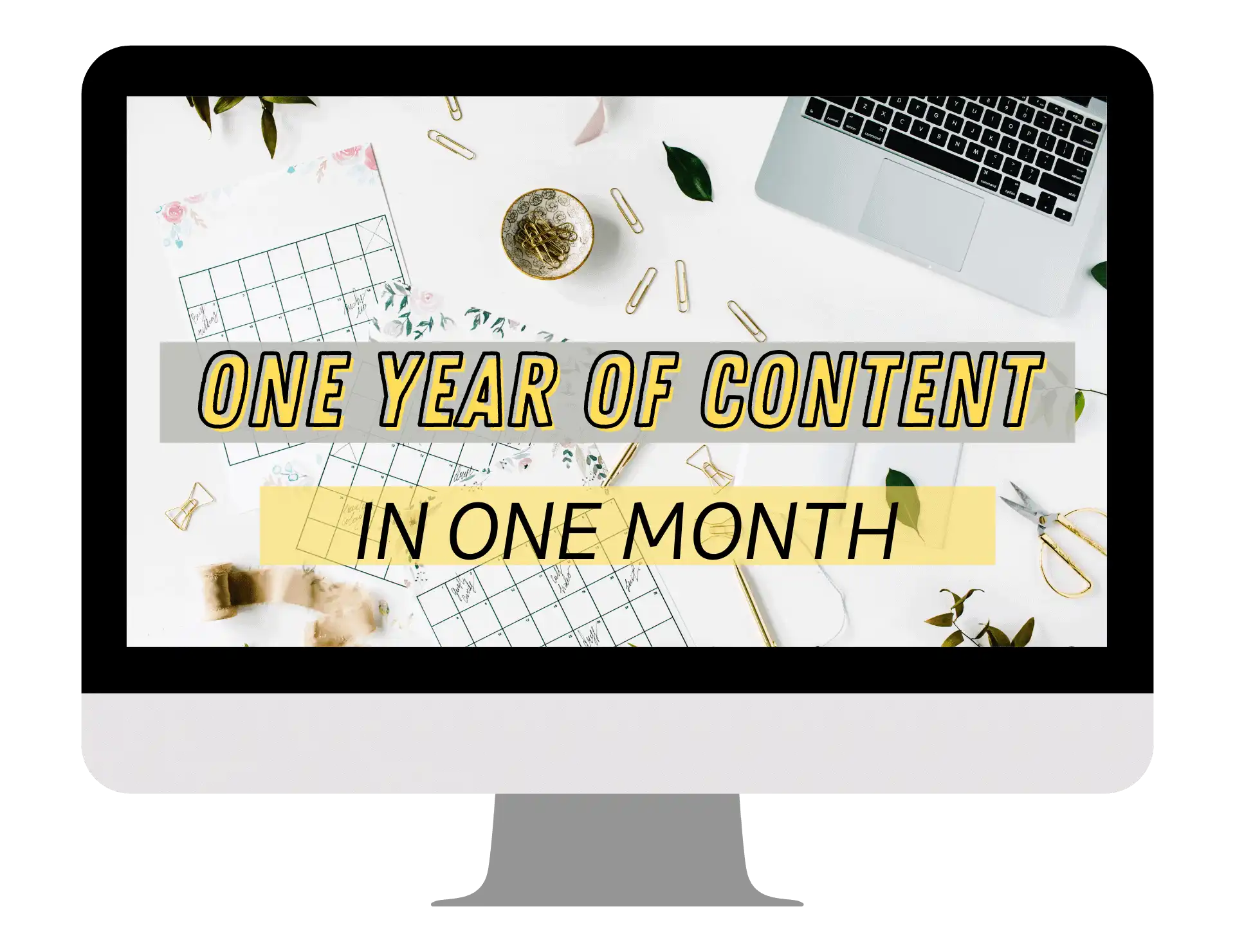How Many Blog Posts To Write A Week Explained
Blogging has been around for decades now. And today, there are many types of bloggers, such as hobby bloggers, travel bloggers, business bloggers, etc.
Regardless of your blogging niche, you’ve probably got stuck wondering how often I should be blogging? Once a week? Once a month? More? Less?
The truth is the answer is different for everyone, and there’s no perfect formula.
There are so many contributors to blog frequency that it can be difficult to find the best blog posting schedule.
And in this article, I’ll explain why there isn’t one hard and fast rule for blogging frequency and how to determine what works best for your niche.
What Is The Ideal Blog Frequency?
There’s a lot of conflicting advice out there about how often you should be blogging. Some people say you should blog as often as possible; others say you should focus on quality over quantity and only publish the very best stuff.
The best answer is it depends. It depends on your audience, content quality, and many other factors. The truth is what works for one person or company might not work for another.
The best way to determine the right blog frequency is through experimentation and A/B testing based on your goals and the needs of your audience.
For example, if you aim to be a thought leader with long-form articles, you should post at least twice per month. But if you are producing short-form content or quick tips, you might want to consider posting over four articles per month.
Different niche audiences have different expectations regarding how often they like to hear from their favorite bloggers and brands.
How Often Should You Blog To Become Successful In Your Niche
When it comes to blogging, the right frequency can make a huge impact on your blog’s growth. Below are some things you should consider before making a blogging schedule.
The Overall Goal Of Your Blog:
The frequency of your blog posts will depend on the overall objective of your blog. Take a step back and think about why you are blogging? What is the end goal of your strategy? You should have a clear idea of what success looks like for your blog.
For example, if you’re focusing on building your brand’s reputation in a specific industry, then you might want to blog once a week to stay relevant, but not so much as to overwhelm your audience.
On the other hand, if you’re a hobby blogger looking to build an audience, you’ll probably want to blog a few times a week. The more content you have, the more likely people will find your website and be interested in what you have to say.
Try asking yourself the following question to help you determine the goal of your blog:
- Who is your audience?
- How much time are you willing to spend on your blog?
- How many page views do you want per month?
- Do you want to be a thought leader in your industry?
Organic Traffic:
Publishing content on your blog is a great way to stay in touch with your customers and establish your authority in your field. In addition to this, it’s an important component of search engine optimization (SEO), a strategy for making sure Google, Bing, and other search engines see your site and prioritize it.
Search engines have developed incredibly sophisticated algorithms to determine which sites are most valuable for users. The algorithms look at everything from how often the term being searched for appears on a page to how quickly pages load.
The more time you spend writing content and optimizing your blog for SEO, the more likely search engines will find and prioritize your site in their results.
But it’s important to remember that frequency is only one part of the bigger picture. Your overall goal should be to provide useful, helpful content that speaks directly to your buyers, not to hit some arbitrary number of posts per month.
For example, HubSpot has more than 100 great marketing posts on its blog. But each post is chock-full of great information; they don’t churn out junk just to post something new every day.
More SEO Tips For Bloggers:
- 10 Easy Steps To Writing And Publishing Your First Blog Post
- How To Write Catchy Titles For Your Blog Posts
- Best SEO Practices For Bloggers
- 7 Key Elements Of A Seo Friendly Blog Post
Your Blogging Niche:
Your blog niche plays a major role in how frequently you should post. Some blog niches require daily posts since they are related to news or events, while other niches don’t need as frequent publications.
If your blog is about a topic that doesn’t change much over time (e.g., gardening tips), you can probably post content less frequently.
In fact, you might find that some of the most popular posts were written years ago and continue to draw a lot of traffic month after month.
However, if the topic of your blog changes regularly (e.g., news reporting), then your blog frequency should be higher. Readers will expect to see new posts on a regular basis.
In general, the more competitive your niche is, the more frequently you’ll need to publish.
Strategy For Content Creation:
Want to write high-quality content fast? Learn how to produce an entire year's worth of blog posts in just 30 days with my proven system for bloggers.
How often you should publish a blog post will also depend on how you plan to create content for your blog. Usually, this is tied to the resources you have available.
For example, If you have a small team, blogging once or twice a week is generally enough to maintain the momentum. You can even consider publishing “evergreen” content (content that will continue to be relevant for months and years) on a weekly basis.
If you have a bigger marketing team, you can increase the number of blog posts to three times a week, although it’s important to realize that this doesn’t mean you should sacrifice high-quality content.
The key is that your frequency needs to be sustainable. It would be best to find a pace that works for your brand and your team.
Your Audience:
Knowing your audience is the most important aspect while determining a publishing schedule. Your target audience dictates how often you should post.
If you get a lot of traffic, then publishing frequently might be the best option. And that is the reason why sites like HuffPost and Tech Crunch are successful. They provide readers with constant, fresh content that’s easy to digest and share.
But if your readers are less engaged, once a week might be enough; if they’re professionals looking for in-depth analysis, once a month is probably fine.
When you write a blog post, you’re making a commitment not only to your readers but also to yourself to come up with something worth saying.
Numbers Of Posts Available:
The more blog posts available on the site, the less often you need to publish new content. This is because old posts can keep driving traffic for years, even if you’re not publishing new content.
In fact, some old blog posts can continue to drive traffic long after you have abandoned them.
On the flip side, If you’re just starting out, there won’t be much content on your site, to begin with. You’ll want to ramp up quickly so your site can start delivering some real value to users.
It’s recommended that blogs with over 100 posts publish one to two times per month, while those with less than 20-30 posts should publish at least twice per week.
Topic Ideas:
When it comes to how often you should blog, it’s important to remember that there is no one-size-fits-all approach. If you’re inspired and find ideas for blog posts that your audience will find intriguing, then write more frequently.
On the other hand, if you’re struggling to come up with new ideas and want to maintain your current frequency of posting, it’s perfectly acceptable (and even preferred) not to publish something just for publishing.
The adage “quality over quantity” certainly applies here. It’s far better to publish a thoughtfully crafted piece of content once a week than a mediocre post daily.
However, you can increase engagement by sharing an old post on your social media accounts every so often, which increases traffic to your site.
This is especially useful if you have evergreen content that remains relevant long after being written.
Content Marketing:
The number of blog posts that you publish each week also depends on how you market your content and what channels you use.
It’s not enough just to put the content up on your site. You also need to promote it, so people know it’s there!
As an example, if your target audience is active on social media and you are using social media as one of your primary channels, then it makes sense to post less often.
But if most of the traffic coming to your site is via organic search, and you’re not actively promoting your posts, then it might be best to publish more frequently.
Pros And Cons Of Posting Blog Posts Frequently
The Pros of Publishing Blog Posts Frequently:
- Posting frequently will keep your website fresh.
- It also gives you better opportunities to improve your search engine rankings.
- More blog posts mean more opportunities for people to link back to your website.
- The more often you publish, the better you’ll get at it, and the more likely it will be that your audience will grow.
- Creating a lot of content can help you become a better writer.
- It allows you to build connections.
The Cons of Publishing Blog Posts Frequently:
As you can see, there are many benefits to publishing frequently. But there are some drawbacks to it too, and it’s essential to acknowledge them.
- If you’re going to maintain a high frequency of posting, you’ll spend a lot of time writing and editing.
- The more posts you publish, the more time it will take to get the word out about them on social media.
- If you start getting a lot more comments than usual, be prepared to put in the extra time to respond to all of them.
- If you post too frequently, you may find that your readers lose interest in reading all your posts.
- You may find that it’s hard to come up with new content regularly.
Finally, Let’s Wrap It Up
Ultimately, it’s up to you. Is there a particular schedule you will be able to adhere to? Does it fit your lifestyle and ease into your routine? How many blogs are you trying to market at once? What kind of content will you have coming out weekly, monthly, or periodically?
These are the kinds of questions you need to ask yourself before deciding how long you should wait between each post. If you can maintain a posting schedule for your blog, you’ll likely be more successful.
I hope you find this article helpful if you have any suggestions leave a comment below! We will discuss it together!
Frequently Asked Question
Q: How Often Should You Blog To Be Successful?
There is no right number that will help your blog succeed. It depends on your goals, your audience, and your niche. But a small number of bloggers recommend publishing at least one-two post per week.
Q: Should I Blog Everday?
The answer is no; you don’t need to blog every day. The best frequency for posting depends on the type of audience you’re targeting and the degree of competition in your niche.
Suppose you’re targeting an audience interested in information about a specific topic, and you’re competing with many other blogs for their attention. In that case, you’ll probably have to post daily or several times a week to get enough traffic.
If you’re targeting an audience interested in a specific product (e.g., a new car or laptop), your readers are likely to be more interested when that product is released.
Q: How Many Posts Should I Publish In A Month?
If you have an established blog and want to increase your traffic, I suggest publishing 2–3 posts per week. This will give you enough volume to attract more readers.
Q: How Often Should I Blog To Make Money?
It all depends on your blogging niche, audience, and content strategy. Some bloggers make money by putting out content every day, and some only post once a week and still earn the same amount.
Written by: Author and the founder of Blogituplife, Shama Shafiq, writes about blogging and marketing on her blog. Her goal with her blog is to help beginner bloggers who need step-by-step guidance.















Amazing Tips Ana… Thanks for that